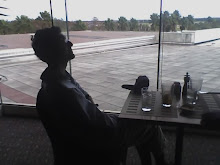It is no surprise that the Massachusetts Correctional Institution in Concord is located near a rotary. For inmates nationwide, incarceration is a loop whose effects they may never escape. A Pew study in 2008 reported “about half of released inmates returning to jail or prison within three years.” This high recidivism rate means more tax dollars will get “locked up” in the prison-industrial complex and our “houses of correction” will not offer any long-term correction.
Recently, I heard several powerful voices speak on behalf of prison reform. Ohio State legal expert Michelle Alexander discussed the issue as it pertains to race relations (her book is titled The New Jim Crow) on Tavis Smiley’s radio program while, ironically, I was in a car driving past MCI-Concord (it may have been a rebroadcast). This week, the “World” TV station broadcast a program about the Dhamma Brothers, inmates at a violent Alabama prison who developed positive behavioral changes after learning Vipassana meditation techniques.
In Alexander’s critique of the American criminal justice system, the concern that resonated most with yours truly is that many criminals are disenfranchised -- temporarily while in jail (which I can understand) or permanently. In 2006, Time magazine reported, “Forty-eight states prohibit current inmates from voting, 36 keep parolees from the polls, 31 exclude probationers, and only two — Vermont and Maine — allow inmates to vote.” The magazine noted that “the impact of these laws still falls disproportionately on poor, minority males.” Permanent exclusion from a public practice of democracy amounts to “piling on” for people who have already done their time.
The Dhamma Brothers film is a way to reach people who may never see get out of prison, and rightly so, since their crimes are heinous. Still, I don’t see why the horrible crimes of inmates should mean that their prisons become a Hobbesian state of anarchy. If meditation teachers want to teach them to be peaceable, it would result in a smoother flow of life in prison, and less stress for the inmates and those who guard them.
Prison reform is a dicey issue for the intelligentsia, whose infatuation with the topic often (a) ignores the anguish of prisoners’ victims and (b) brings further tragedies. (Jack Henry Abbott and former Concord inmate, now incarcerated in Maryland, Willie Horton, for example.) Yet there is a difference between naïve optimism for inmates and a more hardheaded hope … adopting time-tested meditation techniques in an unorthodox setting and restoring time-honored rights to those who leave that setting.
Subscribe to:
Post Comments (Atom)




1 comment:
Nice post, man! I can't believe I wasn't following your blog already.
Post a Comment